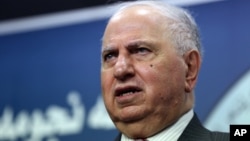Iraqi Shi'ite politician Ahmad Chalabi, a key proponent of the 2003 U.S. invasion of Iraq, died Tuesay at the age of 71. Iraqi media say he suffered a heart attack at his home in Baghdad.
Ahmad Chalabi was loved by some and reviled by others, but he will mostly be remembered for the role he played in the US war in Iraq. As head of the influential Iraqi National Congress, Chalabi used ties with the Bush Administration to lobby for U.S. military action in Iraq.
Information presented by Chalabi about former Iraqi leader Saddam Hussein's alleged weapons of mass destruction was used to support the campaign to launch the U.S. invasion that toppled his regime.
American University of Beirut political science department chairman Hilal Khashan tells VOA he doesn't think the U.S. decision to invade Iraq was made soley on the basis of Chalabi's erroneous information:
“Ex post facto they admitted that they behaved on the basis of wrong information. And, to tell you the truth, I do not think this wrong intelligence information came from Ahmad Chalabi. The decision was made to invade Iraq and Ahmad Chalabi played a role in making it happen," said Khashan.
He also played a key role in de-Ba'athification - the effort to sideline anyone with ties to the ousted Ba'ath party. The process is widely considered a factor in the disastrous Sunni/Shi'ite sectarian split that continues to wreack havoc in Iraq and beyond.
Chalabi, who spent part of his life in the United States, where he studied at the University of Chicago and MIT, went on to play a minor political role in Iraq, where was most recently head of the Iraqi parliament's finance commission.
University of Paris political science professor Khattar Abou Diab says Chalabi's ambition to play a role as intermediary between the United States and Iran, never came to fruition.
"Chalabi failed in his bid to become Iraq's leader, by being a confidante of both the United States and Iran, because Tehran preferred using those who were more submissive, like former Prime Minister Nouri al Maliki," said Diab.
Lebanese media reported Chalabi was not successful as a businessman either, presiding over two bank failures and ending with arrest warrants out for him in Jordan and Switzerland.






